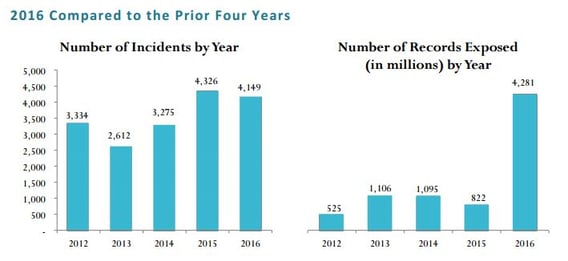2016 takes the cake for the highest number of breaches and exposed records by a long shot.
2013 held the previous high at about a billion records exposed for the year, but 2016 saw 4,149 separate breaches with 4.2 billion records uncovered. The top 10 breaches accounted for 3 billion of those records alone, with Yahoo! taking the hardest hit when 1 billion records were compromised in December.
These numbers come from a new study from Risk Based Security that shows a huge increase in the number of records compromised per breach.

"While the number of data breaches actually remained relatively flat from last year, the big story coming out of 2016 is obviously the massive increase in the number of records exposed.” said Inga Goddijn, Risk Based Security’s Executive Vice President in a press release.
Even though data breaches aren't increasing in frequency, how are they slaying with so much more efficiency?
The report states that 53.3% of the reported breaches were the direct result of malicious hacking, and took 91.9% of the total exposed records. Malware accounted for just 4.5% of the breaches with 0.4% of the total records.
Clearly, hackers are getting much better at their job and are striking bigger gold mines with a smaller number of attempts.
The data shows cyber criminals aren't casting a very wide net either; 123 companies surveyed reported dealing with 2 or more breaches in 2016, with 37% of those reporting 3 or more incidents.
So what can we do in 2017 to curb both the number of data breaches and the number of records they're exposing?
Scott Schober, cybersecurity expert and author of Hacked Again says, "The world’s data volume is growing exponentially year after year. This tremendous growth brings more cyber thieves looking to exploit vulnerabilities leading to increased data breaches in 2017. If we simply accept this is as the new norm, we will only take one step closer to that outcome. But if we use warning signs and headlines to motivate, we can take proactive steps to prevent the next big breach."



